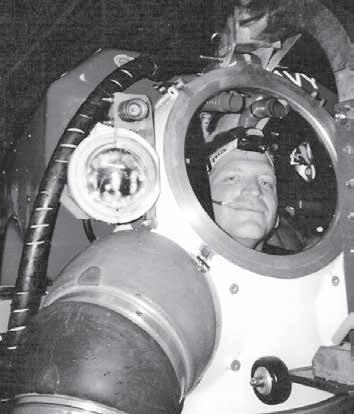
3 minute read
HEALING UNDER PRESSURE
Researcher attempts world record by spending 100 days in an underwater habitat
JACQUELINE HALE www.keysweekly.com
Ten-year-old Joseph Dituri could not hold his breath long enough to unscrew the zinc tab from the bottom of his father’s boat. After a few seconds, he had to resurface, catch his breath and dive back into the murky New York canal water, only to undo one more twist. After 10 minutes and little progress, Dituri’s father handed his son an underwater breathing apparatus.
“Before I dipped my head underwater, his final lesson to me, my only scuba diving lesson, was, ‘Oh, don’t hold your breath,’” Dituri said, recalling his father’s words.
As he worked beneath the surface, a small fish swam up and poked his mask, apparently reacting to seeing its own reflection. Dituri was hooked.
Forty-five years later, Dituri will attempt a world record of 100 days spent in an underwater fixed habitat, a record currently held by Bruce Cantrell and Jessica Fain at 73 days, in a mission called Project Neptune 100. The mission, from March 1 to June 9, will take place in Jules’ Undersea Lodge in Key Largo, a hotel located 30 feet underwater and accessible only by scuba diving. Marine Resource Development Foundation (MRDF)/MarineLab will manage the mission.
Spending 100 days in an underwater habitat will be another major accomplishment to add to Dituri’s biography, which includes retired U.S. Navy commander and Navy saturation diver, doctorate in biomedical engineering, author of several books, chief researcher for the Undersea Oxygen Clinic and chairman of the Florida Chapter of The Explorers Club. But to Dituri and MarineLab, there is a lot more to this mission than beating a world record.

“That’s a small, teeny, tiny portion of this whole thing. Even if I only stayed 60 days but I turned a whole bunch of kids on to exploring the marine environment, that would be a win,” Dituri said.
The 100-day mission has two ma- jor focuses: education and research.
“This whole new group of kids that's out there, if we can incentivize them to be excited about exploration, the undersea environment, research, science, some kind of STEM – science, technology, engineering, mathematics – if we can get them excited about that, we can stimulate the next version of great explorers,” Dituri said.
MarineLab has a long history of engaging young people with marine conservation. In 1984, a group of female students from Broward County stayed for multiple nights in the MarineLab Undersea Classroom in John Pennekamp Coral Reef State Park, the first group of non-military, nondoctorate scientists to live underwater. Now located in its own compound in Key Largo, including the protected lagoon where Jules is located, MarineLab provides opportunities for handson experience with marine life and conservation to some 5,000 kids every year.
“What we've found is that if you take someone who doesn't have any experience with the ocean, and you introduce them to it in a controlled environment with some great, knowledgeable instructors, they make a connection,” Thane Milhoan, mission director and habitat operations manager at Jules’ Undersea Lodge, said. “And when they make that connection, then they typically tend to change their trajectory in life.”
Milhoan hopes to send 30 to 50 students, with chaperones, to join Dituri for an overnight session. They will leave as aquanauts, armed with research experience on one of the mission's science projects and short videos they created documenting their time underwater.
The underwater habitat will also serve as a “digital studio in the sea,” with social media influencers joining a lineup of top scientists to broadcast talks and demonstrations from underwater and spread the message of marine conservation to a wider audience.
Planned scientists include Mikki McComb-Kobza, executive director of Ocean First Institute; Hunter Hines,
Coral Shores principal Laura Lietaert and athletic director Rich Russell pose with Xayver Arrington, left, Corley Smith and John Holly on National Signing Day at the high school auditorium on Feb. 2. DOUG FINGER/Keys Weekly
Joseph Dituri dove in the 2,000-foot seawater Atmospheric Diving Systems suit. While Dituri served as officer-in-charge of the Deep Submergence Unit, Diving Systems Detachment of the U.S. Navy, which certified the suit for use. CONTRIBUTED who holds a doctorate in microbial ecology; Harrison Albert, founder of Animal Interactions Program Advisors; Tim Gallaudet, a retired rear admiral in the U.S. Navy, oceanographer and former acting NOAA administrator; Dr. Douglas Ebersole, an interventional cardiologist; and Alex Brylske, author of “Beneath the Blue Planet.” More speakers will be confirmed leading up to the mission.

Dituri, who works as an associate professor at the University of South Florida, will teach his classes on diving and hyperbaric medicine from Jules’ Undersea Lodge.
The goal is to reach more than 100 million individuals over the 100-day period.
Jules’ Undersea Lodge will also serve as a research hub over the 100
From the command van, located behind him, mission director Thane Milhoan will monitor the Jules’ Undersea Lodge for the 100-day mission. JACQUELINE HALE/Keys Weekly continued on page






